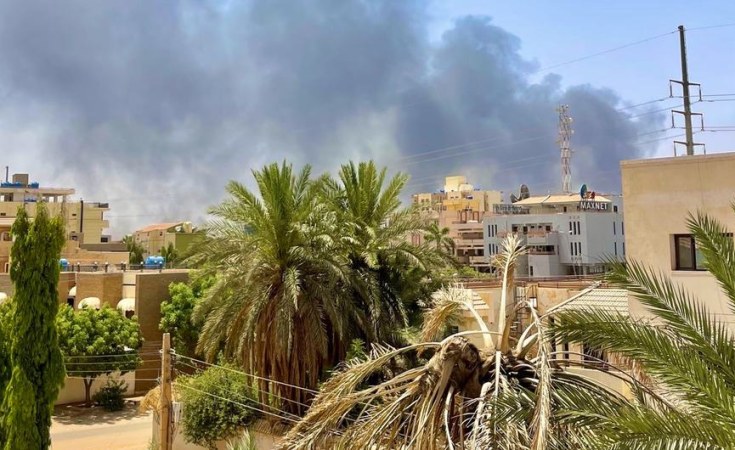Deliveries aim to reach hundreds of thousands of hungry people, but humanitarian access is challenging
The World Food Programme (WFP) has begun delivering food aimed for hundreds of thousands of hungry people in Sudan, with hopes to expand to more areas despite enormous security challenges, including intense fighting raging in parts of the country.
Donate now to help people in Sudan emergency
The clock is ticking. Even as Sudan's conflict unleashes widespread displacement and hardship, the May-November rainy season promises to make swathes of the country inaccessible, and the imminent lean period between harvests is certain to further intensify food insecurity.
"For many people, food and other supplies are running low," says WFP Sudan Country Director Eddie Rowe. "If they are available, they are way beyond the purchasing power of ordinary Sudanese."
In the coming days, WFP plans to immediately reach more than 384,000 people in four Sudanese states -- Gedaref, Gezira, Kassala and White Nile -- with hopes to begin food distributions in a fifth state, Blue Nile. The food is reaching Sudan's most vulnerable: longstanding refugees and displaced people, along with people who have recently fled the ongoing fighting and some of the communities hosting them. As emergency operations ramp up over the coming months, WFP plans to support nearly 5 million people in Sudan with emergency food assistance and 600,000 children and women with prevention and treatment of malnutrition.
The growing hunger numbers from the conflict add to an already alarming food security situation in the country.
"We now see that up to 19 million people in Sudan could struggle to find a meal a day - up from 15 million people last year," Rowe says. Roughly four million children and pregnant and breastfeeding women were acutely malnourished before the fighting started.
Many people are now on the move. Roughly 100,000 have already fled to neighbouring countries, the UN Refugee Agency says - a number that could swell to 800,000 in the coming weeks. Hundreds of thousands more are internally displaced as they race to escape the fighting.
"Aid must be allowed into Sudan, and we need secure and immediate access to be able to distribute it to people who need it most," United Nations Secretary-General António Guterres said last week, warning the Sudanese people were "facing a humanitarian catastrophe."
The crisis has also taken a heavy toll on WFP's operations. Three of our employees and four staff from a partner organization were killed in the unrest, forcing WFP to briefly suspend operations. Many others among our largely national staff in Sudan have been uprooted.
More than 17,000 metric tons of food destined for the country's hungriest people have been looted from our storages and trucks. WFP warehouses, offices and guesthouses in several locations have been completely overrun and - in some cases - burned and damaged.
All this keeps Rowe awake at night. So do the days to come.
Before the conflict erupted, WFP planned to support over 7 million people in Sudan with food assistance, as the lean seasons bites. We would normally preposition food in areas that are at risk of getting cut off by the rains.
But the insecurity now makes the job nearly impossible, especially in conflict hotspots such as the capital Khartoum and across the Darfurs. Already, WFP Sudan faced a US$300 million shortfall over the next six months - even before today's mounting hunger numbers.
"So we are looking at a huge funding deficit," Rowe says.
Still, he is confident donors will step up to help Sudan's people and more than one million refugees that the country shelters. And, despite the unrest, he believes there are ways to reach the hungriest with food assistance.
"There are communities where we've established very strong relationships, and we are going to leverage to see how we can gain access to reach some of these people who desperately need assistance," Rowe says.
He hopes a semblance of stability might return to at least part of the country, allowing people to get back on their feet and humanitarians to do their job.
"I think if we leverage our humanitarian imperative, we will be able to reach the many people who need our assistance," Rowe says.
You can help those affected by the Sudan emergency. Donate now.


